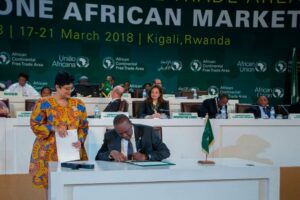
Andrew Dabalen is Right, East African governments ‘must give up some sovereignty’ to make AfCFTA and the EAC Work
The Promise of Supranational Entities
In a recent interview, Andrew Dabalen, the chief economist for Africa at the World Bank, claimed that African governments must give up some sovereignty to make the AfCFTA work. The AfCFTA is a monumental trade agreement that seeks to create a single market for goods and services in Africa, enabling the free movement of people, capital, and goods across the continent. In the past, rigidity and the absolute nature of regional national sovereignty have led to the failure or minimal success of regional integration blocks. It can be argued that these supranational organizations will require more power to act, irrespective of individual nation’s sovereignty, to drive regional integration and boost trade.
This presents a viable room for the implementation of the East African Community single market and the AfCFTA within the region. The African Continental Free Trade Agreement (AfCFTA) and the East African Community (EAC) represent unprecedented opportunities for African nations to accelerate economic growth, foster regional integration, and improve the lives of their citizens. However, does the success of cross-border trade and regional integration among East African nations hinge on the willingness to adapt and evolve the traditional concept of sovereignty?
The Imperative of Ceding Sovereignty
To fully realize the benefits of AfCFTA and EAC, African nations must consider ceding some aspects of their traditional sovereignty. In 2021, the EAC secretariat elected to transition into a political confederation as a nexus for enhanced cross-border trade and increased regional integration. A political confederation would allow nations in the region to cede some sovereignty while retaining a great degree to the EAC and be considered equal partners in the implementation of the community’s aspirations.
However, the region has had a hard time making its aspirations into reality. While ceding ground by sovereign states is justified to cater for the differences in constitutions, varied levels of economic development, and mixed progress in the implementation of the Customs Union, Common Market, and Monetary Union, many member states display continued laxity in embracing a more powerful EAC thus limiting its ability to build economies of scale in the region.
“Sovereignty in the 21st century should be seen as flexible and dynamic, rather than rigid and absolute.”
The dream of the EAC common market remains largely on paper particularly due to the reluctance or unwillingness of member states to play by the rules which requires ceding of some elements of state sovereignty. As currently conceived under the AfCFTA and the EAC, some nations have more to gain in trade from deeper integration than others while the history of colonial rule may make others less eager to cede hard-won sovereignty.
In addition to long-standing political differences among EAC members, these challenges will continue to limit the success of the AfCFTA and the EAC unless more power is transferred to the entity to act decisively on East Africa’s ailing intra-trade. Then, with the perception of regional integration and giving up sovereignty likely to benefit the already successful members but harmful to the other EAC nations, is there an imperative for more power for the supranational organization to act more independently and decisively?
An Elusive but Needed Balance
This concept may raise concerns, but it’s crucial to recognize that sovereignty in the 21st century should be seen as flexible and dynamic, rather than rigid and absolute. A significant challenge in intra-African trade and regional trade in the East African Community has been the continued perpetuation of multiple, and often conflicting regulations and standards among states. In the context of shared trade regulations, ceding sovereignty would translate to accepting common regulations and standards that enhance cross-border business. This can lead to a level of harmonization driving efficiency and creating a more attractive business environment.

The imperative of Border Controls and Tariffs under the EAC has been to enhance the free movement of goods, people, labor, services, and capital from one partner state to another. East African border operations have however been particularly a thorny issue in cross-border trade with tariff and non-tariff barriers cropping up unexpectedly despite the guidance of the common market initiative. Ceding sovereignty can thus involve reducing or eliminating stringent border controls and tariffs. However, this does not call for nations to give up control over borders but rather ease restrictions that would allow for smoother trade flows across the region. An important aspect of the AfCFTA and EAC is reducing non-tariff barriers and simplifying customs procedures, which necessitates cooperation and a certain degree of shared sovereignty.
Thus, within the EAC, decisions affecting the region cannot rest solely within member states. There should be a shared decision-making process that ensures uniform implementation of policies and regulations within the bloc. This collaborative approach enhances regional integration and provides a more stable and predictable environment for businesses.
The East African Community Perspective, So far
The East African Community members, in addition to creating a framework for a political confederate, have existing frameworks for ceding some element of sovereignty while driving trade, economic growth, and regional integration. The EAC has established a customs union and a common market, allowing for the free movement of goods, services, capital, and people within the region which only calls for a bigger AfCFTA and EAC role in shaping trade activities. The region has also undertaken ambitious infrastructure projects, such as the proposed Standard Gauge Railway, to connect Kenya, Uganda, Rwanda, and South Sudan which would aid in better transportation and reduced costs for increased regional integration.
The Challenges Ahead
It’s important to acknowledge that ceding sovereignty is not without challenges. Nations should proceed cautiously, ensuring that they protect their national interests and their citizens’ well-being.
East African Nations must thus protect vulnerable industries and sectors during the transition to a more open and integrated market. Temporary safeguards and targeted support can help local industries adapt to increased competition, create a room for seamless transition and put leaders and citizens at ease in the long run.
It is incumbent upon the AFCFTA and EAC secretariats, in collaboration with individual nations and the private sector to create effective monitoring and enforcement mechanisms essential in ensuring that all member states comply with shared regulations and standards. Without this, the benefits of regional integration, even with nations ceding sovereignty to the entities, may not be fully realized.
Moreover, decision-making process within regional body must be inclusive and transparent, allowing all member states to voice their concerns and have a say in important decisions. This is crucial for building trust and cooperation.
As we move forward, it’s important to remember that ceding sovereignty is not equivalent to surrendering independence. Rather, it’s about finding a balance between national interests and the collective interests of the region. By embracing a more flexible approach to sovereignty, East African nations can unlock the full potential of AfCFTA and the East African Community, fostering a brighter and more prosperous future for their citizens.



